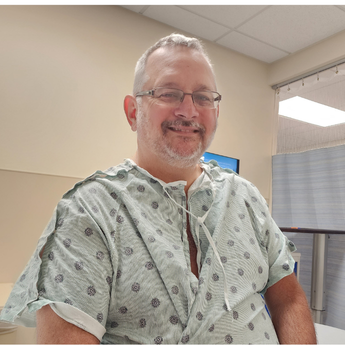By Adriana Ermter
In our monthly column, senior writer and editor Adriana Ermter shares her personal experiences with breast cancer.
A few years ago, a friend shared a story about the first trimester of her pregnancy. She was thrilled to be pregnant, but at the time, kept her pregnancy under wraps as she hadn’t passed the three-month safety zone. She was also sick as a dog, overwhelmed with intense nausea and fatigue, that heightened during her twice-daily, 25-minute subway commute to and from work. Despite looking green-ish, sweaty, unstable on her feet and gripping whatever pole or hand railing was available, not once in 90 days did anyone sitting on the subway offer my friend their seat. She’d felt invisible.
There are many, highly visible Toronto Transit Commission (TTC)-branded signs adhered to subway cars’ walls requesting passengers act courteously and give their seat to persons in need. But it rarely happens. Still, that’s not the part of my friend’s story that sticks with me. Her lack of voice, her inability to ask for what she needed is what resonates. I get it.
I often felt just as voiceless and invisible post breast cancer surgery, when I was in daily treatment and commuting on public transit from my home to Princess Margaret Hospital to work and then, back home again. Asking a stranger for their seat didn’t feel like an option. It would have required getting the seated person’s attention, most likely by tapping them on their closest body part as they would have been preoccupied with their phone, laptop or iPad and then, politely, asking them for their seat, which would have required an explanation. And trust me when I say, I had zero desire to tell a complete stranger in a pin-could-drop-quiet subway car that I had cancer and needed to sit down.
Also, it would have been bizarre. An anomaly in longstanding TTC culture among nine to fivers, breaking the unspoken but well-observed Presto-card-carrying rules: to mind your own business, to keep your earbuds in whether you’re listening to something or not, to stare straight ahead or downwards without making eye contact with other commuters, to sit on your seat (should you be lucky enough to secure one that isn’t wet, dirty, or covered in dried vomit or other bodily fluids), with your knees together and your purse, bag and/or backpack on your lap, and to be quiet and never, ever ask for someone’s seat, even if you’re about to topple over.
The TTC subway wasn’t the only place breast cancer rendered me silent and see-through. I experienced this regularly when I’d walk down the street to the grocery store or to the bank, people whipping past me, scurrying forward with their busy lives while mine operated in slow motion. At the hospital’s jam-packed breast cancer clinic, where in the reception area I became a mere number in thousands. With family and friends who likened my breast cancer to “routine women’s health issues,” or in one case, like “getting my tonsils taken out.”
I felt particularly unseen in the workplace, even though I had been 100 per cent transparent about my health with my supervisor and colleagues and subsequently, perhaps as a result, I was passed over for promotion, ignored in meetings and viewed as not contributing enough. Worse, my then boss treated me as though nothing was going on and not once asked “how I was feeling?” Now that I’m healthy and on a few dating apps, I’m experiencing a different kind of dismissal. Not always, but sometimes I now see my dates’ faces flash between horror, discomfort and it-was-nice-to-meet emotions should I dare disclose that I had cancer.
I don’t have a solution for any of this. Speaking out loud about having breast cancer is a personal choice, one only you and I can make. For me, the passing of time has helped significantly and I’m now comfortable talking and writing about my experiences. But I’m also no longer fighting for my health and my healthcare services or feeling overwhelmed with medical decisions, doctors’ appointments, treatment, sleep deprivation and utter exhaustion.
I also won’t pretend that there weren’t moments when I was grateful to be invisible. Not always needing to be seen gave me a sense of normalcy. I didn’t need or want the entire world to know what I was going through. This invisibility helped me to retain and protect important pieces of myself, like my dignity, my identity and my inner strength and courage. Recently, I reposted a friend’s Facebook post on Instagram. The words summarize this invisible disease and everything that comes with it perfectly. I’ll end this article by sharing it here with you.
“Be so fucking proud of yourself for passing your hardest moments alone while everyone believed you were fine.” –Anonymous
Adriana Ermter is a multi award-winning writer and editor. Her work can be read in Figure Skater Fitness, Living Luxe and IN Magazine, as well as online at 29Secrets.com, RethinkBreastCancer.ca, Popsugar.com and AmongMen.com. The former Beauty Director for FASHION and Editor-in-Chief for Salon and Childview magazines lives in Toronto with her two very spoiled rescue cats, Murphy and Olive. You can follow Adriana on Instagram @AdrianaErmter







